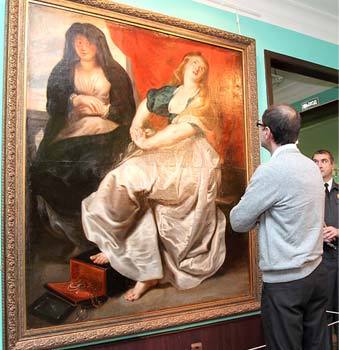
It was unveiled Thursday in the museum in the small town of Irbit around 200 kilometres (124 miles) from the nearest big city of Yekaterinburg.
The head of painting restoration from the Hermitage museum in Saint Petersburg, Viktor Korobov, examined the painting on Thursday, and said it was "undoubtedly an original, created with the participation of Rubens' pupils," Karpov said.
The face of Jesus's follower Mary Magdalene and her arms are believed to have been painted by Peter Paul Rubens himself, while the figure of her sister could have been painted by pupils in his large workshop, Karpov said.
The Hermitage gave the painting to the provincial museum in 1975, when Karpov, then its young director, asked for some art to fill its walls, hoping only for good-quality copies.
The Irbit museum kept the painting in its archives since it was in a poor condition and only last year received state funding to restore the painting.
The painting is known to have been owned by a teacher at a military medical academy at the end of the 19th century. It was requisitioned by the Bolsheviks, who passed it to the Hermitage in 1931 labelled as a Rubens copy, Karpov said.
The painting closely resembles an original in Vienna's Kunsthistorisches Museum, but "there are many differences in the details... Our painting is more vivid, the face is more noble, the hair is golden as typical for Rubens," said deputy director Andrei Gamlitsky.
Rubens would often paint several versions of paintings, up to eight sometimes, and would use his pupils to help him, among them Anthony Van Dyck, the future court painter.
The painting will now undergo further testing including analysis of the canvas and the undercoat, Gamlitsky said.
---------------------------------------------------------------------------------------------------------------
The head of painting restoration from the Hermitage museum in Saint Petersburg, Viktor Korobov, examined the painting on Thursday, and said it was "undoubtedly an original, created with the participation of Rubens' pupils," Karpov said.
The face of Jesus's follower Mary Magdalene and her arms are believed to have been painted by Peter Paul Rubens himself, while the figure of her sister could have been painted by pupils in his large workshop, Karpov said.
The Hermitage gave the painting to the provincial museum in 1975, when Karpov, then its young director, asked for some art to fill its walls, hoping only for good-quality copies.
The Irbit museum kept the painting in its archives since it was in a poor condition and only last year received state funding to restore the painting.
The painting is known to have been owned by a teacher at a military medical academy at the end of the 19th century. It was requisitioned by the Bolsheviks, who passed it to the Hermitage in 1931 labelled as a Rubens copy, Karpov said.
The painting closely resembles an original in Vienna's Kunsthistorisches Museum, but "there are many differences in the details... Our painting is more vivid, the face is more noble, the hair is golden as typical for Rubens," said deputy director Andrei Gamlitsky.
Rubens would often paint several versions of paintings, up to eight sometimes, and would use his pupils to help him, among them Anthony Van Dyck, the future court painter.
The painting will now undergo further testing including analysis of the canvas and the undercoat, Gamlitsky said.
---------------------------------------------------------------------------------------------------------------









 Home
Home Politics
Politics









